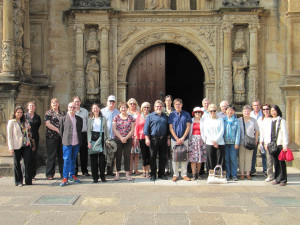How are legal issues and the courts depicted in the media? How has the advent of new media altered legal coverage? And what impact does the structure and content of legal reporting have on public perceptions and the conduct of legal affairs? These questions were addressed over the course of two days at “Law in the Age of Media Logic,” a workshop co-organized by IJPM, held at the International Institute for the Sociology of Law (IISJ) in Oñati, Spain, and attended by 24 scholars from Australia, Brazil, Canada, China, Israel, Spain, the United Kingdom, and the United States.
The international group of scholars in attendance represented a number of academic fields, including communications, the legal academy, political science, and sociology. This great diversity of workshop participants produced a wide-ranging assessment of the media and its effects. Participants analyzed judiciaries at all levels (from trial courts to supreme courts), and considered a variety of court-related actions from judicial nominations and high-profile judicial decisions to the increasing judicial efforts to manage public relations. Participants also discussed criminal and civil litigation as well as the broad differences between common law and civil law systems. Traditional newspaper and television reporting received substantial attention, as did web-based news coverage and social media. Workshop participants also repeatedly engaged the issue of public trust, debating the alternate ways in which the media have sustained and eroded public faith in legal authority. The workshop revealed that there is much to be gained from interdisciplinary analysis of law and media. We plan to bring our discussion to a broader audience by publishing workshop papers in the IISJ’s peer-reviewed journal. We also hope to continue the fruitful lines of inquiry advanced in the workshop by organizing a collaborative research network on law and the media.
The workshop program can be found here.

